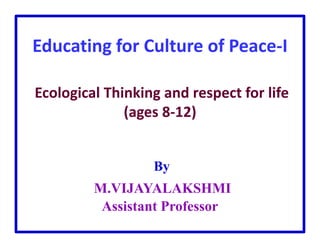
Educating for Culture of Peace-I
- 1. Educating for Culture of Peace-I Ecological Thinking and respect for life (ages 8-12) By M.VIJAYALAKSHMI Assistant Professor
- 2. Objectives At the end of the course the student teacher will 1. Understand the concept of peace education. 2. Understand the dynamics of transformation of violence into Peace. 3. Understand the nature of conflicts and their resolution. 4. Imbibe the knowledge, attitudes and skills needed to achieve and sustain a global culture of peace. 5. Adopt peace education in the curriculum.
- 3. Unit – 6: Educating for Culture of Peace-I 6.1 Ecological Thinking and respect for life (ages 8-12) 6.2 Tolerance and respect for human rights (ages 11 to 16) 6.3 Critical thinking and active non-violence (ages 12+) - knowledge, attitude and skills to be learnt at classroom activities
- 4. Unit – 6: Educating for Culture of Peace-I 6.1 Ecological Thinking and respect for life (ages 8-12)
- 5. • “A culture of peace is a set of values, attitudes, modes of behaviour and ways of life that reject violence and prevent conflicts by tackling their root causes to solve problems through dialogue and negotiation among individuals, groups and nations. ” - (UN Resolutions 1998)
- 6. • Peace Education is a field of theory and practice of education related to the idea of promoting knowledge, values, attitudes and skills conducive to peace and active commitment to the building of a cooperative and caring democratic society.
- 7. Ecological Thinking and Respect for Life (Age 8-12) • Peace Education aims to develop knowledge, attitudes and skills and an environment of tolerance, care, and respect for life through cooperative and participatory learning methods in the classroom. • In this journey of shared learning environment students could be nurtured and empowered to take responsibility for their own growth and achievement while teachers care for the well- being of all students.
- 8. • The practice of culture of peace is an opportunity to promote the total welfare of students, advocate for their just and equitable treatment of adolescence, and promote individual and social responsibility for both educators and learners. • Teaching about the environment and the perception of environmental responsibility is a crucial component of Peace Education.
- 9. • The following learning activity may be most suited for children between the ages of eight and twelve. The knowledge, attitudes, and skills related to the holistic appreciation for the value of life and the interdependence of living systems on the planet can be effectively dealt with following learning objectives.
- 10. Learning Objectives At the end of the activity, students will be able to Knowledge • Gain knowledge about the nature • Know elemental aspects of the environment • Begin to see connections between environment and themselves
- 11. Attitudes • Gain ecological awareness • Appreciate Earth as a living system • Display care for others and the planet • Valuing water • Demonstrate a cooperative approach to learning
- 12. Skills • Practice active listening • Develop an ability to participate and express their opinions • Discovering ways of saving water.
- 13. Learning Activity 1: Care for the Planet - Saving Water This is an activity that helps to learn civil responsibility for saving water. • Step 1: In the beginning students can be made to brainstorm many uses of water. Then teacher should list them on the blackboard. • Step 2: Students can be asked to form groups and discuss ‘Why we should save water’?
- 14. • Step 3: Teacher should make a summary and present it to the class. Every presentation should be followed by a brief discussion. • Ex: What are the ways of saving water at homes, at school, at farms and at community level?
- 15. • Step 4: Then students have to go back to the same groups and take one topic to discuss. Students may be asked to make a guide to save water in the given places. Each group can be asked to present the guide they have prepared to the class. A brief discussion should be followed with each presentation.
- 16. • Step 5: At end of the class, each student should be made to verbally complete the following phases. 1. By saving water 1 help ________ 2. One way I can help saving water at home is __________
- 17. Assessment: • Students should be given feedback about the activity and then reported back to the class. Students should ask each other the following questions and teachers are asked to record their responses for evaluation.
- 18. • What did you enjoy about this activity? • What part was difficult? • What is one thing you learned in this unit? • What surprised you about your work for this unit? • How would you teach a friend or relative about water? • Do you think saving water matters in your life? If so, in what ways?
- 19. • Learning Activity 2: A Tree Addresses Us • Learning Activity 3: Silent Watching
- 20. Sources are taken from •Slidesharenet.com •Web sources
